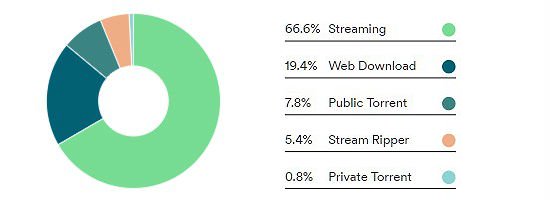YesPornPlease and VShare.io Go Offline Following Massive Copyright Lawsuit
lundi 2 mars 2020 à 12:16 Back in September 2019, TF discovered the existence of a DMCA subpoena in the United States.
Back in September 2019, TF discovered the existence of a DMCA subpoena in the United States.
Filed by MG Premium, part of the Mindgeek adult empire, it demanded that Cloudflare should hand over the personal details of two of its customers – YesPornPlease.com and VShare.io – a pair of sites that ostensibly operate as user-generated content platforms.
YesPornPlease is, in particular, a massive operation. The latest stats from SimilarWeb reveal the site servicing more than 100 million visitors in January 2020, a figure that had been steadily increasing over the previous few months.
The information requested by MG Premium included the site operators’ names, email addresses, IP addresses, user histories, posting histories, physical addresses and telephone numbers. Now, several months later, MG Premium is back with a full-blown lawsuit against YesPornPlease and VShare, one that demands an extremely broad injunction and damages that could potentially run into hundreds of millions of dollars.
Filed in a Washington court against “Does 1-20” doing business as YesPornPlease and/or VShare, the lawsuit begins by stating that the conduct of both platforms is both “egregious and willful”.
“Defendants own and operate websites engaged in the business of copying and distributing infringing audiovisual works. Under the guise of acting as a distributor of ‘user-generated content,’ Defendants in fact are directly and knowingly involved in the trafficking of tens of thousands of pirated works – including thousands of works owned by MG Premium,” the lawsuit begins.
While user-generated content sites such as YouTube enjoy flexibility under the DMCA in respect of infringing content uploaded by third-parties, MG Premium insists that the defendants in its lawsuit cannot be placed in this category.
“The YesPornPlease Web Site fails to fulfill the requisite conditions precedent to qualify for the safe harbor provisions of the DMCA. Specifically, the YesPornPlease Web Site does not have an appointed registered DMCA Agent. Further, Defendants fail to honor take-down notices sent to the YesPornPlease Web Site and have failed to implement a reasonable repeat infringer policy,” the complaint notes.
While the lawsuit doesn’t reference the earlier DMCA subpoena filed against Cloudflare, it seems that MG Premium is still unable to identify the operators of YesPornPlease or VShare. Noting that the YesPornPlease site is hosted by a company in Russia, MG says it doesn’t know where its owners and operators are located.
Nevertheless, the adult giant insists that the two platforms work in concert to supply infringing content to consumers in the United States and should be held accountable.
“The YesPornPlease Web Site is a pirate website, displaying copyrighted adult entertainment content without authorization or license. The YesPornPlease Web Site is operated in conjunction with the VShare Web Site, wherein purported Internet users desiring to post videos on the YesPornPlease Web Site must actually upload the video to the VShare Web Site and then are directed to ‘copy and paste’ the URL assigned to the uploaded video on the VShare Web Site onto the YesPornPlease Web Site,” the complaint reads.
According to MG, the sites also incentivize users to upload content via an affiliate program.
“By becoming an affiliate to the VShare Web Site, users can earn money for each view of a video on the YesPornPlease Web Site posted through the VShare Web Site. The affiliate’s payout rate is determined based upon a variety of factors, including file size (calculated in minutes), the amount of content downloaded, and the length of time content is watched/viewed. The more content watched, the more money an affiliate makes,” the company claims.
Both sites utilize domain name servers operated by Cloudflare and their identities are hidden by a company called Domain Protection Services, MG Premium claims. The platforms allegedly use many other US-based companies for their operations too, including domain registrar Namecheap and various advertisers supplying ads targeted at the United States market.
The level of infringement alleged in the lawsuit is massive. Between July 2017 and January 2020, YesPornPlease is claimed to have offered 3,078 works owned by MG Premium, each detailed in a massive list in the 233-page complaint. According to the adult company, it sent takedown notices for thousands of URLs but 98% of them were ignored. Furthermore, users who uploaded the infringing videos were never terminated as repeat infringers by either platform.
“Defendants knowingly promote, participate in, facilitate, assist, enable, materially contribute to, encourage, and induce copyright infringement, and thereby have infringed, secondarily infringed, and induced infringement by others, the copyrights in Plaintiffs’ copyrighted work,” the complaint adds.
“Defendants’ acts and omissions allow them to profit from their infringement while imposing the burden of monitoring Defendants’ website onto copyright holders, without sufficient means to prevent continued and unabated infringement.”
As a result, MG Premium claims that the platforms are liable for directly infringing its rights while inducing others to do so. For this the company says it is entitled to statutory or actual damages, potentially running to hundreds of millions of dollars, plus a broad injunction to prevent future infringement.
In respect of the injunction, MG Premium demands that all entities acting in concert or participation with the defendants should be prevented from contributing in any way towards a range of actions that result in its copyrighted works being made available to the public.
On top of preventing hosting providers from doing business with the sites, for example, MG Premium demands that Internet search engines, ISPs, domain name registrars and registries should, within five days, prevent US users of the sites from accessing them by “blocking or attempting to block access to all domains, subdomains, URLs, and/or IP Addresses that has as its sole or predominant purpose to enable to facilitate access to the YesPornPlease Web Site and/or the VShare Web Site.”
At the time of writing, YesPornPlease and VShare are both down and displaying Cloudflare errors.
As reported last week, MG Premium is also pursuing legal action against individual BitTorrent users in Sweden, demanding around $700 in compensation to make supposed lawsuits go away.
The complaint filed by MG Premium against YesPornPlease.com and VShare.io can be obtained here (pdf)
Source: TF, for the latest info on copyright, file-sharing, torrent sites and more. We also have VPN reviews, discounts, offers and coupons.
 In recent years, adult entertainment outfit Malibu Media has often been described as a copyright trolling operation.
In recent years, adult entertainment outfit Malibu Media has often been described as a copyright trolling operation.
 Over the past decade, online piracy has presented itself as a massive problem for the U.S. and its entertainment industries.
Over the past decade, online piracy has presented itself as a massive problem for the U.S. and its entertainment industries. 
 When large ‘pirate’ services are taken down, the tendency is for copyright holders and/or the authorities to make a lot of noise. Taking out big players is seen as an achievement and is often held up as an example to others not to follow the same path.
When large ‘pirate’ services are taken down, the tendency is for copyright holders and/or the authorities to make a lot of noise. Taking out big players is seen as an achievement and is often held up as an example to others not to follow the same path.